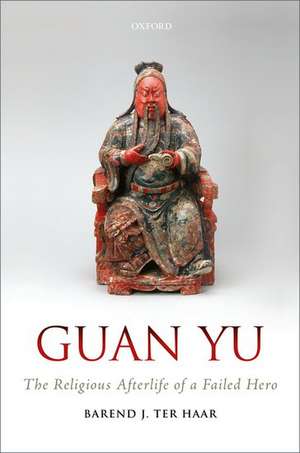Guan Yu: The Religious Afterlife of a Failed Hero
Autor Barend J. ter Haaren Limba Engleză Hardback – 12 oct 2017
Preț: 717.03 lei
Preț vechi: 965.59 lei
-26% Nou
Puncte Express: 1076
Preț estimativ în valută:
137.21€ • 146.72$ • 114.40£
137.21€ • 146.72$ • 114.40£
Carte tipărită la comandă
Livrare economică 07-12 aprilie
Preluare comenzi: 021 569.72.76
Specificații
ISBN-13: 9780198803645
ISBN-10: 0198803648
Pagini: 304
Ilustrații: 19 black and white images, maps, and tables
Dimensiuni: 168 x 241 x 26 mm
Greutate: 0.62 kg
Editura: OUP OXFORD
Colecția OUP Oxford
Locul publicării:Oxford, United Kingdom
ISBN-10: 0198803648
Pagini: 304
Ilustrații: 19 black and white images, maps, and tables
Dimensiuni: 168 x 241 x 26 mm
Greutate: 0.62 kg
Editura: OUP OXFORD
Colecția OUP Oxford
Locul publicării:Oxford, United Kingdom
Recenzii
Rich in detail and methodologically rigorous, this landmark study provides a basis for multifaceted explorations of the Lord Guan cult. Ideally, it will also register a profounder point about the working of collective memory and the religious imagination in imperial China.
Ter Haar's book is a magisterial survey of the development of the Lord Guan cult that is essential reading for all interested in the relationship between religion and violence in the Chinese tradition.
It is clear that this work aims to experiment in vivo with a new method that restores oral culture by exhuming writings and objects. Barend ter Haar believes in the independence of religious life from written sources, the influence of the latter on the former to be demonstrated each time. In a civilization where the written word is as old as the world, the challenge is great. [Tranlated from French]
Ter Haar's book is a magisterial survey of the development of the Lord Guan cult that is essential reading for all interested in the relationship between religion and violence in the Chinese tradition.
It is clear that this work aims to experiment in vivo with a new method that restores oral culture by exhuming writings and objects. Barend ter Haar believes in the independence of religious life from written sources, the influence of the latter on the former to be demonstrated each time. In a civilization where the written word is as old as the world, the challenge is great. [Tranlated from French]
Notă biografică
Barend J. ter Haar studied in Leiden, Shenyang, and Fukuoka. He obtained his doctoral degree in 1990 in Leiden, and worked in Leiden and Heidelberg before coming to Oxford in 2013. Ter Haar has published extensively on new religious groups, lay Buddhism, Triad ritual and mythology, the spread of rumours, religious culture and violence, local religious culture, and ethnicity. He is currently completing a book dealing with the social history of witchcraft fears and persecution in traditional China.
